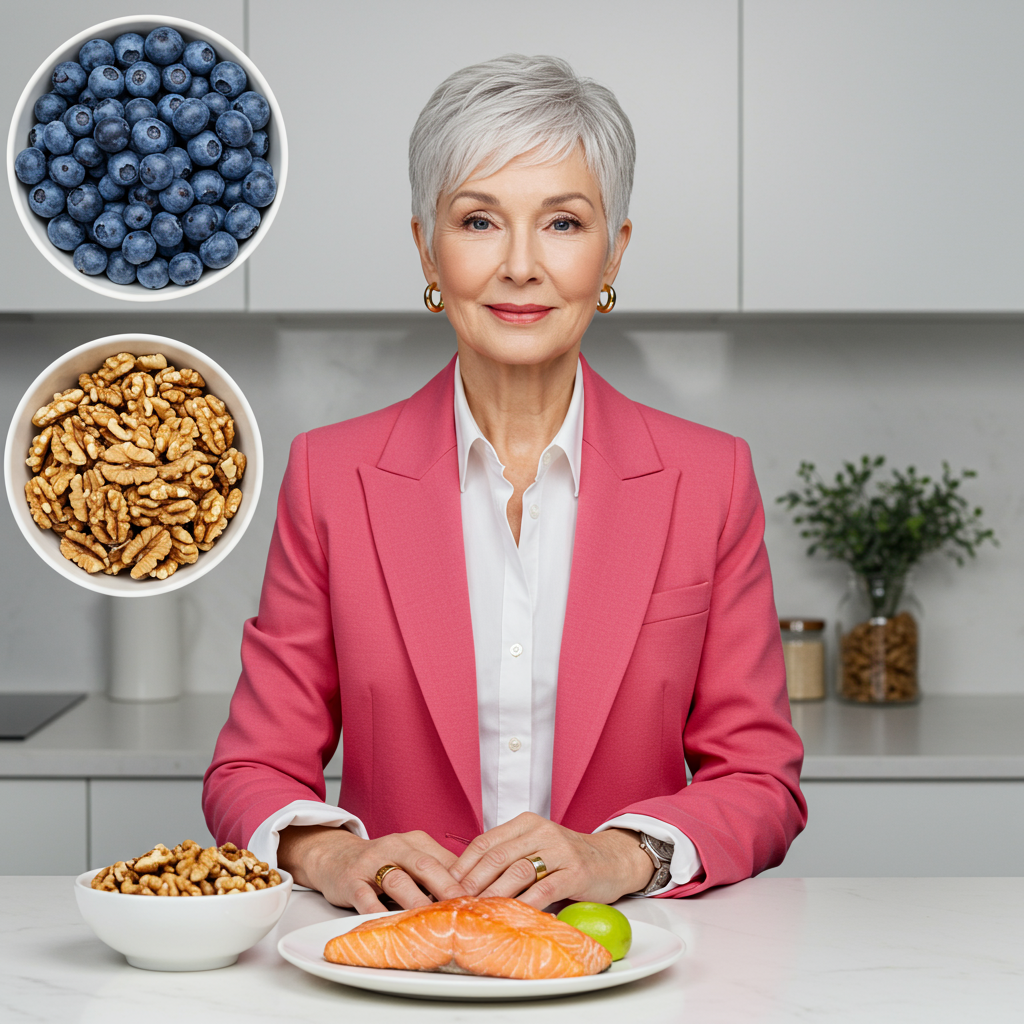Concerned about your memory or finding yourself wondering if occasional forgetfulness is more than just normal aging? You’re not alone. Mild cognitive Impairment (MCI), a state where memory and thinking skills show noticeable changes beyond typical age-related shifts, affects a significant number of older adults. For many, MCI can be a precursor to more serious cognitive decline and conditions like Alzheimer’s disease. While there isn’t a cure for dementia, researchers are intensely focused on identifying lifestyle factors that might help prevent or delay its onset. Diet is emerging as one of the most powerful and controllable tools we have for protecting our brain health as we age.
Mounting evidence suggests that what we eat significantly impacts brain function and resilience over time. Antioxidant-rich foods, in particular, have been flagged as potential brain protectors. However, questions have remained: how much impact do they really have, and can other common habits, like drinking alcohol, interfere with these benefits? A recent study published in the journal Nutrients set out to explore this precise relationship, examining the link between dietary antioxidants, alcohol intake, and the likelihood of experiencing mild cognitive impairment in older adults. The findings are compelling and offer crucial insights into maximizing your brain’s potential through strategic food choices.
How Researchers Investigated Diet and Brain Health
To understand the connection between antioxidants, alcohol, and cognitive health, the research team conducted a cross-sectional study. This type of study provides a snapshot of data from a specific point in time. The participants included 1,084 adults aged 55 and older living in China.
Participants provided detailed information about their diet, lifestyle, alcohol consumption habits, and health history through questionnaires. Their cognitive function was assessed using the Montreal Cognitive Assessment (MoCA). The MoCA is a widely accepted screening tool designed to help detect mild cognitive impairment.
Using responses from a validated dietary questionnaire, the researchers calculated a Composite Dietary Antioxidant Index (CDAI) for each individual. This index specifically tracked intake of six key nutrients known for their antioxidant properties: vitamin A, Vitamin C, Vitamin E, Magnesium, Zinc, and Selenium. Based on their CDAI scores, participants were categorized into four groups, ranging from the lowest to the highest antioxidant intake. This allowed the scientists to compare cognitive outcomes across different levels of dietary antioxidant consumption.
The Powerful Findings: Antioxidants Offer Significant Protection
The study revealed a striking pattern: individuals with higher scores on the Composite Dietary Antioxidant Index showed substantially lower odds of having mild cognitive impairment. Specifically, those with the highest antioxidant intake demonstrated up to an 80% reduced risk compared to those consuming the fewest antioxidants. This highlights a strong association between a diet rich in these specific nutrients and better cognitive function in older age.
However, the benefits weren’t universal across all participants. A critical finding emerged when the researchers factored in alcohol consumption. The significant protective effects of a high-antioxidant diet were statistically observed only among the individuals who reported not drinking alcohol at all.
This suggests that alcohol consumption, even at moderate levels, might counteract the positive impact of a diet rich in protective antioxidants. The study noted that participants who consumed alcohol just one to two times per week had more than double the odds of experiencing mild cognitive impairment compared to those who abstained entirely.
Interpreting the Results and Recognizing Limitations
While the findings linking high antioxidant intake to lower MCI risk are encouraging, it’s crucial to understand the nature of a cross-sectional study. This design can identify associations or correlations between factors (like diet and cognitive status), but it cannot definitively prove cause and effect. For instance, people with healthier lifestyles overall might also consume more antioxidants and less alcohol, making it challenging to isolate the effect of diet alone.
Furthermore, the dietary data was collected via self-report. This method can sometimes be subject to inaccuracies as people may not perfectly recall everything they’ve eaten. The study did control for several other factors known to influence brain health, such as age, education level, and depression. However, it did not collect detailed information on the specific type or exact amount of alcohol consumed, which could provide further nuance.
Despite these limitations, this study adds significant weight to the existing body of research. It strongly supports the idea that dietary choices, particularly focusing on antioxidant-rich foods and considering alcohol intake, play a vital role in maintaining cognitive health as we age. It serves as a powerful reminder that while research continues, we have actionable dietary strategies available right now.
Translating Findings into a Brain-Boosting Eating Pattern
The study’s results reinforce the long-standing advice from nutrition experts: prioritizing whole, plant-based foods rich in antioxidants is a cornerstone of a brain-healthy diet. Focusing on colorful fruits, vegetables, nuts, seeds, and whole grains is a practical way to increase your intake of the nutrients highlighted in the study, including Vitamins A, C, E, Magnesium, Zinc, and Selenium.
Here are some excellent food sources for these brain-supporting nutrients:
Leafy Greens (Spinach, Kale, Collard Greens): Abundant in Magnesium and Vitamin E.
Berries (Blueberries, Strawberries, Raspberries): Packed with Vitamin C and other powerful antioxidants.
Citrus Fruits (Oranges, Grapefruits, Lemons): Outstanding sources of Vitamin C.
Root Vegetables (Carrots, Sweet Potatoes): Rich in Beta-Carotene, which the body converts to Vitamin A.
Winter Squash (Butternut, Acorn): Another great source of Vitamin A.
Nuts and Seeds (Almonds, Sunflower Seeds, Walnuts): Provide Vitamin E, Selenium (especially Brazil nuts, though not listed in CDAI, they are high in Selenium), and Magnesium.
Whole Grains (Oats, Brown Rice, Quinoa): Good sources of Magnesium and Zinc.
Legumes (Beans, Lentils): Contribute Magnesium and Zinc.
Incorporating a wide variety of these foods ensures you get a broad spectrum of beneficial compounds working together. Instead of relying on supplements, focusing on whole foods provides a matrix of nutrients and fiber that supports overall health, including brain function.
The Role of Alcohol: A Closer Look
The study’s finding that alcohol consumption potentially cancels out the antioxidant benefits is particularly noteworthy. For years, there has been discussion about the potential benefits of moderate red wine intake due to its antioxidant content (like resveratrol). However, this research suggests that any potential antioxidant benefits from alcohol may be overshadowed by alcohol’s overall negative effects on the brain.
Alcohol is known to induce oxidative stress and inflammation, both of which can harm brain cells and pathways. It can also interfere with nutrient absorption. The study indicates that even light to moderate drinking (1-2 times per week) might be enough to interfere with the brain-protective effects of a high-antioxidant diet and could be associated with increased odds of MCI.
Rather than seeking antioxidants in alcoholic beverages, the more evidence-backed approach for brain health is to get these vital compounds directly from food. A handful of berries or nuts offers antioxidants without the potential neurotoxic effects of alcohol.
Simple Steps for a Brain-Friendly Diet
Making significant dietary changes can feel daunting, but even small, consistent adjustments can add up. Think about how you can incrementally boost your intake of antioxidant-rich foods.
Start your day by adding berries or nuts to your oatmeal or yogurt.
Include a variety of colorful vegetables with your lunch and dinner.
Snack on fruits, nuts, or seeds instead of processed foods.
Blend a handful of spinach into your morning smoothie – you might not even taste it!
Experiment with adding legumes to soups, salads, or stews.
If you regularly consume alcohol, consider reducing your intake or exploring non-alcoholic alternatives like sparkling water with fruit or herbal teas.
Remember, consistency is key. Focus on progress, not perfection. These dietary shifts are an investment in your long-term cognitive well-being.
Frequently Asked Questions
What specific antioxidants and nutrients did the study link to lower cognitive decline risk?
The study focused on the Composite Dietary Antioxidant Index (CDAI), which measured the intake of six specific nutrients known for their antioxidant properties. These were Vitamin A, Vitamin C, Vitamin E, Magnesium, Zinc, and Selenium. The research found that higher overall intake of these six nutrients from food sources was associated with significantly lower odds of having mild cognitive impairment.
Which foods are the best sources of the brain-protective nutrients mentioned?
To boost your intake of the nutrients in the CDAI, focus on a variety of whole, plant-based foods. Excellent sources include leafy greens (Magnesium, Vitamin E), berries and citrus fruits (Vitamin C), carrots and sweet potatoes (Vitamin A), nuts and seeds (Vitamin E, Selenium, Magnesium), whole grains (Magnesium, Zinc), and legumes (Magnesium, Zinc). Eating a diverse range of these colorful foods helps ensure you get a good mix.
Does moderate alcohol consumption negate the brain benefits of an antioxidant-rich diet?
According to this specific study, the protective effect of a high-antioxidant diet on cognitive function was only statistically significant among individuals who did not consume alcohol. Participants who drank alcohol, even just one to two times per week, had higher odds of mild cognitive impairment compared to non-drinkers, suggesting that alcohol consumption may counteract the benefits gained from eating antioxidant-rich foods.
Conclusion
This research published in Nutrients provides compelling support for the role of diet in protecting against mild cognitive impairment. It strongly suggests that a dietary pattern rich in antioxidants from foods like fruits, vegetables, nuts, seeds, and whole grains is associated with a significantly reduced risk of cognitive decline – potentially by as much as 80%. Crucially, the study also highlights that alcohol consumption may interfere with these protective benefits, even at moderate levels. For optimal brain health as you age, the evidence points towards embracing a diet abundant in diverse, colorful plant foods and re-evaluating your relationship with alcohol. Making these conscious choices today is a proactive step toward safeguarding your cognitive vitality in the future.
Word Count Check: 1185



